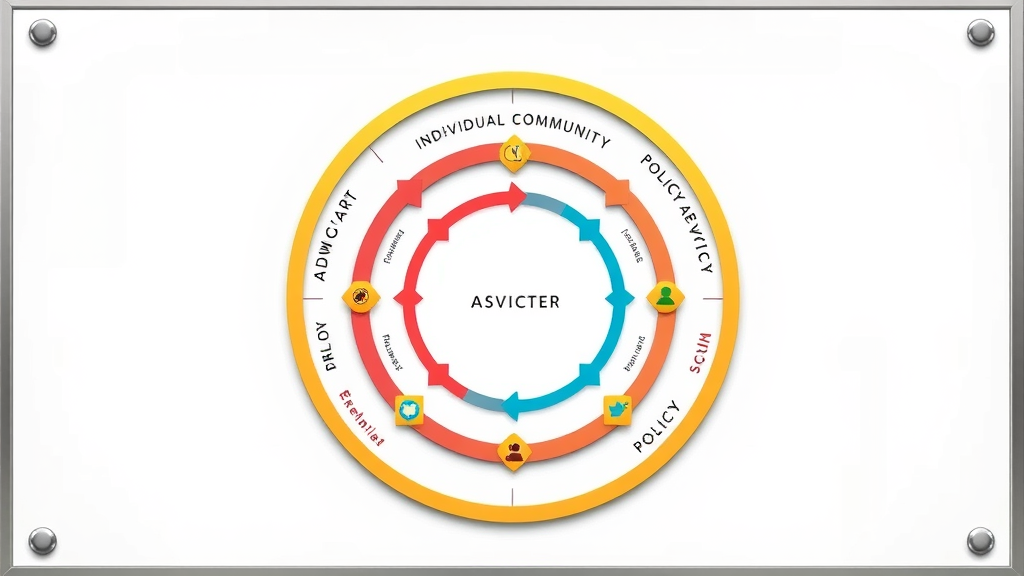Did you know that nearly 60% of global deaths could be prevented through effective public health advocacy and interventions? In an era marked by pandemics, environmental crises, and rising health disparities, your individual voice is not just powerful—it’s more critical than ever. The stakes are high, but so is your potential to drive meaningful change. Whether you realize it or not, every action you take can ripple across policies, communities, and lives. This article unpacks the exhilarating impact of public health advocacy and shows why your participation is the missing piece in solving today’s most urgent health challenges.
Every Action Counts: The Growing Need for Public Health Advocacy in Today’s World
Did you know that nearly 60% of global deaths could be prevented through effective public health advocacy and interventions? In a rapidly changing world, your voice is more influential than ever.
In today’s interconnected world, public health advocacy has become an essential force in shaping healthier communities everywhere. Health challenges such as infectious disease outbreaks, increasing mental health concerns, and climate change-related risks demand urgent action—not just from governments, but from individuals like you. Your involvement, be it a simple conversation or a coordinated campaign, can influence public policy , shift public perceptions, and improve health outcomes on a broad scale. From the global fight against pandemics to localized problems like access to health care, each step—big or small—adds up. In public health advocacy, small actions often lead to monumental changes, proving there's no substitute for grassroots momentum.
Imagine a community where everyone feels empowered to voice concerns, share credible information, or push for stronger health laws. That’s the foundation of successful advocacy. By joining the movement—volunteering, educating others, or contacting health officials—you’re helping to close the gaps that perpetuate social determinants of health. The need for active citizens has never been greater. When you act, you’re not just helping yourself; you’re safeguarding entire populations and setting new standards for health equity.

What You Will Gain from Understanding Public Health Advocacy
- Develop a foundational understanding of public health advocacy;
- Recognize the importance of health advocacy roles;
- Learn the three types of advocacy and how they apply to healthcare;
- Explore practical strategies and examples of public health advocacy;
- Discover actionable steps to become a successful public health advocate.
Defining Public Health Advocacy: Bridging Policy and People
What is Public Health Advocacy? Key Roles and Importance
| Aspect | Description |
|---|---|
| Definition | The process of promoting public health policies and practices |
| Stakeholders | Individuals, communities, policymakers |
| Impact | Policy changes, improved health outcomes, increased awareness |
Public health advocacy bridges the gap between scientific evidence, community needs, and policy action. At its core, it’s the active support of new and improved health policies , laws, and initiatives that aim to promote health and control disease across populations. Advocates—ranging from local volunteers to global organizations—raise their voices for public health issues like vaccine access, mental health, and clean water. Their efforts can sway public opinion, inspire legislative change, and prioritize urgent health issues that impact millions.
Stakeholders in public health advocacy include not only health professionals and officials but also everyday citizens who care deeply about their communities. By using persuasive, evidence-based communication, advocates influence decision-makers and champion health for all. The goal is to foster changes that lead to better health outcomes for entire populations. When policy changes are enacted, they don’t just affect a single community—they create healthier environments, improve resources, and ultimately save lives on a massive scale.
The Crucial Intersection of Health Advocacy and Public Health
"Public health advocacy transforms community needs and evidence into real-world improvements by influencing decision-makers and public perception."
Health advocacy is more than just raising concerns—it is about taking coordinated action to promote, protect, and advance population health . This vital intersection means that every health advocate , whether working in clinics, legislatures, or neighborhoods, helps turn public health challenges into opportunities for improvement. By focusing on policy change, education, and empowerment, advocates address the social determinants of health and tackle deep-rooted health disparities.
The most effective public health advocates understand the need to work closely with varied stakeholders, including public health officials, community leaders, and government entities. Together, they can address tough public health issues—like tackling the opioid crisis, expanding mental health resources, or championing anti-smoking regulations. Ultimately, strong advocacy leads to better laws, greater awareness, and more resilient health systems. Through this collective power, advocates can elevate health as a human right and create sustainable health improvements for generations to come.

Types of Public Health Advocacy: From Grassroots to Institutional
Exploring the Three Types of Advocacy in Public Health
- Individual Advocacy;
- Community Advocacy;
- Systems or Policy Advocacy
Public health advocacy isn’t a one-size-fits-all approach. There are multiple forms of advocacy in healthcare, each operating at different levels and with unique impacts. Individual advocacy typically involves assisting specific people or families as they navigate the healthcare system or address a personal health issue. This hands-on approach supports those facing barriers like language, finances, or access to health.
Community advocacy scales up these efforts, engaging groups and neighborhoods to tackle local health challenges—such as organizing neighborhood wellness events, promoting immunization programs, or fighting for cleaner parks. At the highest level, systems or policy advocacy seeks to change rules, laws, and systemic health practices at local, regional, or even national levels. By leveraging collective voices, advocates can impact policy change, secure funding, and shift the direction of public health for entire populations.

For a closer look at how advocacy can directly influence health regulations and consumer safety, consider the recent developments around food additives. The FDA's decision to ban Red Dye No. 3 is a prime example of how persistent advocacy and scientific evidence can drive regulatory change to protect public health. You can explore the details and implications of this policy shift in this comprehensive overview of the FDA's Red Dye No. 3 ban .
How Each Advocacy Type Powers Health Advocacy on Different Levels
Each type of advocacy is integral to advancing public health goals and tackling persistent health issues. Individual advocacy empowers people to navigate complex systems, inhabit healthier environments, and demand better care. For instance, a health advocate might help a patient secure access to essential medication or negotiate with insurance providers to get necessary treatments.
On the community level, advocates develop programs and coordinate with organizations to address issues like childhood obesity, substance misuse, or mental health. These efforts foster healthier social norms and cultivate support networks that can quickly disseminate information and resources. Systems or policy advocacy, meanwhile, focuses on long-term population health by pushing for new laws, funding priorities, and structural reforms—like passing clean air legislation or securing mental health parity in insurance coverage. Together, these types of advocacy build a tapestry of support that advances population health and promotes healthy communities across the globe.
Why Public Health Advocacy Matters: Real-World Impact and Examples
Case Studies: Successful Public Health Advocacy Initiatives
- Tobacco control campaigns;
- Immunization advocacy;
- Mental health policy reforms
Public health advocacy delivers tangible results. Take tobacco control campaigns as an example—decades of dedicated advocacy have led to stringent health laws restricting advertising, increasing taxes, and establishing smoke-free zones. These changes have directly contributed to a decline in tobacco-related diseases, illustrating the power of persistent policy change. Similarly, immunization advocacy has protected countless children and adults from preventable diseases. By supporting evidence-based messaging, building trust, and addressing public misperceptions, advocates have increased vaccine uptake and reduced the spread of deadly illnesses.
Mental health policy reforms highlight another accomplishment, as advocates have promoted the inclusion of mental health services in public health systems. Through coalition building and direct engagement with policymakers, advocacy groups have secured insurance parity, reduced stigma, and ensured mental health is recognized alongside physical health. These examples prove that effective health advocacy can save lives, improve access to services, and change the trajectory of public health.
What Is an Example of Advocacy in Healthcare?
Imagine a healthcare worker taking the time to help a group of patients understand their rights to medication access. By clarifying prescription rules and walking patients through the insurance process, that health advocate is performing a critical role in supporting the community. This kind of daily advocacy creates immediate and lasting impacts, from ensuring continuity of care to connecting patients with social services. Often, it’s these “small” acts—answering questions, sharing resources, or challenging unfair practices—that ultimately change lives and support broad public health issue solutions. By addressing health challenges at the ground level, advocates help promote health equity and ensure everyone receives the support they need.

Becoming a Public Health Advocate: Steps to Make a Difference
How to Become a Public Health Advocate: Skills, Education, and Pathways
Becoming a public health advocate is open to anyone dedicated to improving the health of others and their community. While many advocates work in health professions such as epidemiology, nursing, or health education, others come from different backgrounds—including social work, policy, and environmental science. Education in public health, health policy, or related fields provides a strong foundation, but practical experience is equally valuable. Volunteering with community organizations, joining a health association, or interning at a public health agency all offer hands-on skills that are essential for effective advocacy.
Key skills for advocates include strong communication and the ability to convey complex health issues in relatable, motivating ways. Strategic networking, robust research capabilities, and a commitment to evidence-based solutions are also vital. With perseverance and passion, anyone can embark on the journey to promote health and push for positive policy changes at every level—from local clinics to international health organizations.
Essential Qualities of an Effective Public Health Advocate
- Empathy and cultural competence;
- Evidence-based communication;
- Strategic networking;
The best health advocates combine compassion with clear, data-driven communication. Empathy helps them connect with diverse populations, while cultural competence ensures that solutions respect different values and lived experiences. Evidence-based skills allow advocates to speak persuasively with policymakers, health officials, and the media—ensuring decisions are guided by the latest research, not by misinformation or bias.
Building a strong professional network within the health sector amplifies advocacy impact. By collaborating with like-minded groups, attending conferences, and staying informed about current public health issues, advocates remain aware of emerging health challenges and solutions. This adaptable, collaborative mindset is the hallmark of effective advocacy, enabling progress even in the face of setbacks or changing political priorities.

Watch and learn the essentials of public health advocacy, including the critical roles it plays in shaping health policies, outcomes, and communities. (Embed video here if available)
Overcoming Challenges in Health Advocacy: Barriers and Solutions
Common Obstacles in Public Health Advocacy
- Political resistance;
- Resource limitations;
- Public misperceptions
Advocating for public health is never without its obstacles. Political resistance can arise when proposed health policies are seen as controversial or threaten established interests. Even well-supported health initiatives may falter if resources—funding, staff, or training—are lacking. In addition, public misperceptions or misinformation can undermine support for science-based interventions, as seen in ongoing debates over vaccines or climate change policy. These challenges require creative, persistent, and informed responses from advocates at all levels.
Understanding these barriers is the first step to overcoming them. Framing health issues in clear, relatable ways, building broad-based coalitions, and leveraging technology to distribute accurate information are effective strategies. By remaining adaptable and responsive, advocates can anticipate resistance and adjust tactics to maintain momentum, even when the path to health policy change is difficult.
Strategies to Address Advocacy Barriers
To address these obstacles, successful advocates cultivate relationships with policymakers, leverage media to amplify their messages, and prioritize ongoing education of the public. Building alliances across sectors—such as engaging educators, businesses, and faith leaders—expands the network of support and helps to break down silos that can hinder progress. Utilizing social media, storytelling, and visually engaging materials can counteract misinformation and keep the public engaged with key health issues.
Furthermore, advocates must nurture resilience and flexibility when responding to changing legal or policy environments. They can appeal to shared values like community well-being, fairness, and the common good, which often transcend partisan divides. In doing so, they help foster a culture that values health and is willing to make collective investments for long-term benefits.

Ethical Considerations in Public Health Advocacy
Public health advocacy demands a deep commitment to ethical principles. Advocates must respect the autonomy, dignity, and privacy of individuals and communities involved in advocacy efforts. They must also be vigilant about avoiding conflicts of interest and ensuring that interventions are both evidence-based and culturally sensitive. Honest communication and transparency about goals, limitations, and potential risks build trust with stakeholders, which is crucial for long-lasting impact. By putting ethics at the forefront, advocates strengthen the accountability and effectiveness of their work, ensuring efforts truly promote healthy outcomes for all.
Experience real-life journeys of health advocates making a difference in their communities. (Embed video here if available)
Frequently Asked Questions on Public Health Advocacy
What is the public health advocacy?
Public health advocacy is the process of promoting changes in health policies, systems, and practices that benefit entire populations. Advocates work to identify health issues, engage with stakeholders, and influence decision-makers to advance positive health outcomes, reduce disparities, and build healthier communities.
What are the three types of advocacy?
The three main types of advocacy in public health are individual advocacy (supporting personal or family health navigation), community advocacy (addressing local public health challenges through collective action), and systems or policy advocacy (seeking wider changes in public policy and law to promote health and equity).
What is an example of advocacy in healthcare?
An example of healthcare advocacy is a nurse helping patients understand their rights and access necessary treatments, or a community leader organizing a campaign for wider mental health resources. These efforts remove barriers and promote healthy outcomes for individuals and larger communities alike.
How to become a public health advocate?
You can become a public health advocate by pursuing education in health-related fields, volunteering in your community, joining a health association, and developing strong communication and networking skills. Anyone passionate about improving health outcomes can make an impact, regardless of their professional background.
Take Action: Amplify Your Public Health Advocacy Voice Today
- Join public health advocacy groups;
- Support health campaigns;
- Connect with policymakers;
- Share credible information with your community;
Every step you take to champion public health—whether volunteering, spreading reliable news, or connecting with local health officials—helps to amplify your voice and the collective power of advocates around the world. The drive for better health begins with one person and multiplies with every action. Your advocacy can inspire policy change and improve lives for generations.
A Recap: Your Role in the Future of Public Health Advocacy
- Everyone can contribute to public health advocacy;
- Change at the local and global level depends on collective action;
- Ongoing education and advocacy are essential for public health progress
Take action and ensure your voice is counted—your advocacy can build a healthier, more resilient world for everyone.
As you continue your journey in public health advocacy, consider how global health trends and emerging threats can shape the priorities of advocates everywhere. For a broader perspective on how rising health concerns—such as the resurgence of infectious diseases—demand coordinated advocacy and policy responses, explore the latest insights on rising tuberculosis cases and global health warnings . Deepening your understanding of these issues will empower you to make an even greater impact in your advocacy efforts and help build a healthier future for all.
 Add Row
Add Row  Add
Add 




Write A Comment